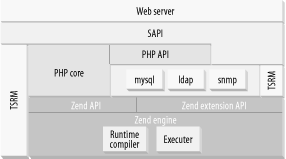
Chapter 14. Extending PHP
Contents:
Architectural Overview
What You'll Need
Building Your First Extensions
The config.m4 File
Memory Management
The pval/zval Data Type
Parameter Handling
Returning Values
References
Global Variables
Creating Variables
Extension INI Entries
Resources
Where to Go from Here
This chapter shows you how to write C language extensions to PHP. Although most functionality can be written in the PHP language, sometimes you need the extra speed and control you get from the C API. C code runs an order of magnitude faster than most interpreted script code, and it is also the mechanism for creating the thin middle layer between PHP and any third-party C library.
For example, to be able to talk to the MySQL database server, PHP needs to implement the MySQL socket protocol. It would be a lot of work to figure out this protocol and talk to MySQL directly using fsockopen( ) and fputs( ) from a PHP script. Instead, the same goal can be accomplished with a thin layer of functions written in C that translate MySQL's C API, implemented in the libmysqlclient.so library included in MySQL, into PHP language-level function calls. This thin layer of functions is known as a PHP extension. PHP extensions do not always have to be a layer between PHP and some third-party library, however. An extension can instead completely implement some feature directly (for example, the FTP extension).
Before we get into the details of writing extensions, a note of caution. If you are just learning PHP and do not have any sort of C programming background, you should probably skip this chapter. Extension writing is an advanced topic, and it is not for the faint of heart.
14.1. Architectural Overview
There are two kinds of extensions that you can write: PHP extensions and Zend extensions. We will focus on PHP extensions here. Zend extensions are lower-level extensions that somehow modify the very core of the language. Opcode cache systems such as APC, Bware afterBurner, and ZendCache are Zend extensions. PHP extensions simply provide functions or objects to PHP scripts. MySQL, Oracle, LDAP, SNMP, EXIF, GD, and ming are all examples of PHP extensions.
Figure 14-1 shows a diagram of a web server with PHP linked in. The web server layer at the top handles incoming HTTP requests and passes them to PHP via the Server Abstraction API (SAPI). The "mysql", "ldap", and "snmp" boxes represent loadable PHP extensions, the kind you'll learn how to build in this chapter. TSRM is the Thread Safe Resource Manager layer, which helps simplify thread-safe programming. The PHP Core contains many of the nonoptional core features of PHP, and the PHP API contains the PHP-specific API functions used by both the core and the PHP extensions. Finally, there is the Zend engine, which runs scripts through a two-pass mechanism, first generating a set of opcodes and then executing them. A PHP extension uses the Zend extension API to receive arguments from function calls and return values back.

Figure 14-1. Structure of a PHP-linked web server

Copyright © 2003 O'Reilly & Associates. All rights reserved.



